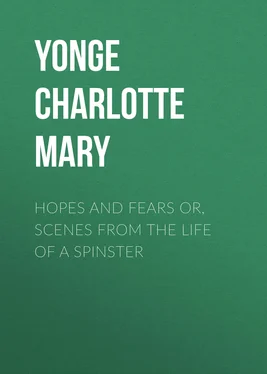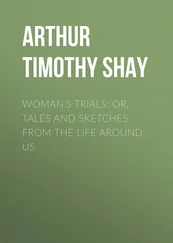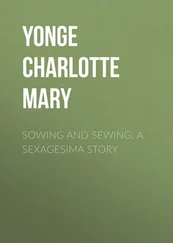Charlotte Yonge - Hopes and Fears or, scenes from the life of a spinster
Здесь есть возможность читать онлайн «Charlotte Yonge - Hopes and Fears or, scenes from the life of a spinster» — ознакомительный отрывок электронной книги совершенно бесплатно, а после прочтения отрывка купить полную версию. В некоторых случаях можно слушать аудио, скачать через торрент в формате fb2 и присутствует краткое содержание. Жанр: foreign_prose, literature_19, Европейская старинная литература, foreign_antique, на английском языке. Описание произведения, (предисловие) а так же отзывы посетителей доступны на портале библиотеки ЛибКат.
- Название:Hopes and Fears or, scenes from the life of a spinster
- Автор:
- Жанр:
- Год:неизвестен
- ISBN:нет данных
- Рейтинг книги:5 / 5. Голосов: 1
-
Избранное:Добавить в избранное
- Отзывы:
-
Ваша оценка:
- 100
- 1
- 2
- 3
- 4
- 5
Hopes and Fears or, scenes from the life of a spinster: краткое содержание, описание и аннотация
Предлагаем к чтению аннотацию, описание, краткое содержание или предисловие (зависит от того, что написал сам автор книги «Hopes and Fears or, scenes from the life of a spinster»). Если вы не нашли необходимую информацию о книге — напишите в комментариях, мы постараемся отыскать её.
Hopes and Fears or, scenes from the life of a spinster — читать онлайн ознакомительный отрывок
Ниже представлен текст книги, разбитый по страницам. Система сохранения места последней прочитанной страницы, позволяет с удобством читать онлайн бесплатно книгу «Hopes and Fears or, scenes from the life of a spinster», без необходимости каждый раз заново искать на чём Вы остановились. Поставьте закладку, и сможете в любой момент перейти на страницу, на которой закончили чтение.
Интервал:
Закладка:
‘And you went to sleep?’
‘Yes; I liked to see the mason go chip, chip, and I wanted to see them fit the thing in. I got into that great pew, to see better; and I made myself a nest, but at last they were all gone.’
‘And what did you do, then? Were you afraid?’
‘I didn’t know what to do. I ran all about to see if I could look out at a window, but I couldn’t.’
‘Did you try to call?’
‘Wouldn’t it have been naughty?’ said the boy; and then with an impulse of honest truthfulness, ‘I did try once; but do you know, there was another voice came back again, and I thought that die Geistern wachten sich auf .’
‘The what?’
‘ Die Geistern das Lieschen sagt in die Gewolben wohnen ,’ said little Robert, evidently quite unconscious whether he spoke German or English.
‘So you could not call for the echo. Well, did you not think of the bells?’
‘Yes; but, oh! the door was shut; and then, I’ll tell you—but don’t tell Mervyn—I did cry.’
‘Indeed, I don’t wonder. It must have been very lonely.’
‘I didn’t like it,’ said Robert, shivering; and getting to his German again, he described ‘ das Gewitter ’ beating on the panes, with wind and whirling leaves, and the unearthly noises of the creaking vane. The terror of the lonely, supperless child was dreadful to think of; and she begged to know what he could have done as it grew dark.
‘I got to Mr. Charlecote,’ said Robert—an answer that thrilled her all over. ‘I said I’d be always very good, if he would take care of me, and not let them frighten me. And so I did go to sleep.’
‘I’m sure Mr. Charlecote would, my dear little man,’ began Honora, then checked by remembering what he would have said. ‘But didn’t you think of One more sure to take care of you than Mr. Charlecote?’
‘Lieschen talks of der Lieber Gott ,’ said the little boy. ‘We said our prayers in the nursery, but Mervyn says only babies do.’
‘Mervyn is terribly wrong, then,’ said Honora, shuddering. ‘Oh! Robert, Mr. Charlecote never got up nor went to bed without asking the good God to take care of him, and make him good.’
‘Was that why he was so good?’ asked Robert.
‘Indeed it was,’ said she, fervently; ‘nobody can be good without it. I hope my little friend will never miss his prayers again, for they are the only way to be manly and afraid of nothing but doing wrong, as he was.’
‘I won’t miss them,’ said Robert, eagerly; then, with a sudden, puzzled look—‘Did he send you?’
‘Who?’
‘Mr. Charlecote.’
‘Why—how should . . . ? What made you think so?’
‘I—why, once in the night I woke up; and oh! it was so dark, and there were such noises, such rattlings and roarings; and then it came all white—white light—all the window-bars and all so plain upon the wall; and then came—bending, bending over—a great gray darkness—oh! so horrible!—and went away, and came back.’
‘The shadow of the trees, swaying in the moonlight.’
‘Was it? I thought it was the Nebel Wittwen neckten mir , and then the Erlkonung-tochter . Wissen sie —and oh! I did scream once; and then, somehow, it grew quietly darker; and I thought Mr. Charlecote had me folded up so warm on his horse’s back, and that we rode ever so far; and they stretched out their long white arms, and could not get me; but somehow he set me down on a cold stone, and said, “Wait here, Robin, and I’ll send her to lead you.” And then came a creaking, and there were you.’
‘Well, little Robin, he did not quite send me; but it was to see his tablet that I came down this morning; so he brought me after all. He was my very dear Cousin Humfrey, and I like you for having been his little friend. Will you be mine, too, and let me help you, if I can? and if your papa and mamma give leave, come and see me, and play with the little girl and boy who live with me?’
‘Oh, yes!’ cried Robert; ‘I like you.’
The alliance was sealed with a hearty kiss.
‘But,’ said Robert, ‘you must ask Mademoiselle; papa and mamma are away!’
‘And how was it no one ever missed you?’
Robert was far less surprised at this than she was; for, like all children, to be left behind appeared to him a contingency rather probable than otherwise.
He was a fine-looking boy, with dark gray, thoughtful eyes, and a pleasant countenance; but his nerves had been so much shaken that he started, and seemed ready to catch hold of her at every sound.
‘What’s that?’ he cried, as a trampling came along the alley as they entered the garden.
‘Only my two little cousins,’ said Honora, smiling. ‘I hope you will be good friends, though perhaps Owen is too young a playfellow. Here, Lucy, Owen—here is a little friend for you—Robert Fulmort.’
The children came eagerly up, and Lucilla, taking her hand, raised her face to kiss the stranger; but Robert did not approve of the proceeding, and held up his head. Lucilla rose on tiptoe; Robin did the same. As he had the advantage of a whole year’s height, he fully succeeded in keeping out of her reach; and very comical was the effect. She gave it up at last, and contented herself with asking, ‘And where do you come from?’
‘Out of the church,’ was Robin’s reply.
‘Then you are very good and holy, indeed,’ said Owen, looking at him earnestly, with clasped hands.
‘No!’ said Robert, gruffly.
‘Poor little man! he was left behind, and shut up in the church all night, without any supper,’ said Honora.
‘Shut up in the church like Goody Two-shoes!’ cried Lucilla dancing about. ‘Oh, what fun!’
‘Did the angels come and sing to you?’ asked Owen.
‘Don’t ask such stupid questions,’ cried his sister. ‘Oh, I know what I’d have done! Didn’t you get up into the pulpit?’
‘No!’
‘And I do so want to know if the lady and gentleman on the monument have their ruffs the same on the inside, towards the wall, as outside; and, oh! I do so want to get all the dust out of the folds of the lady’s ruff: I wish they’d lock me into the church, and I’d soon get out when I was tired.’
Lucilla and Owen decidedly thought Robin had not profited by his opportunities, but he figured better in an examination on his brothers and sisters. There were seven, of whom he was the fourth—Augusta, Juliana, and Mervyn being his elders; Phœbe, Maria, and Bertha, his juniors. The three seniors were under the rule of Mademoiselle, the little ones under that of nurse and Lieschen, and Robert stood on neutral ground, doing lessons with Mademoiselle, whom, he said, in unpicked language which astounded little Owen, ‘he morally hated,’ and at the same time free of the nursery, where, it appeared, that ‘Phœbe was the jolliest little fellow in the world,’ and Lieschen was the only ‘good-natured body going,’ and knew no end of Mährchen . The boy spoke a very odd mixture of Lieschen’s German and of English, pervaded by stable slang, and was altogether a curious study of the effects of absentee parents; nevertheless Honora and Lucilla both took a considerable fancy to him, the latter patronizing him to such a degree that she hardly allowed him to eat the much-needed breakfast, which recalled colour to his cheek and substance to his voice.
After much thought, Owen delivered himself of the sentiment that ‘people’s papas and mammas were very funny,’ doubtless philosophizing on the inconsistency of the class in being, some so willing, some so reluctant, to leave their children behind them. Honor fully agreed with him, but did not think the discussion profitable for Robin, whom she now proposed to take home in the pony-carriage. Lucilla, always eager for novelty, and ardent for her new friendship, begged to accompany her. Owen was afraid of the strangers, and preferred Miss Wells.
Читать дальшеИнтервал:
Закладка:
Похожие книги на «Hopes and Fears or, scenes from the life of a spinster»
Представляем Вашему вниманию похожие книги на «Hopes and Fears or, scenes from the life of a spinster» списком для выбора. Мы отобрали схожую по названию и смыслу литературу в надежде предоставить читателям больше вариантов отыскать новые, интересные, ещё непрочитанные произведения.
Обсуждение, отзывы о книге «Hopes and Fears or, scenes from the life of a spinster» и просто собственные мнения читателей. Оставьте ваши комментарии, напишите, что Вы думаете о произведении, его смысле или главных героях. Укажите что конкретно понравилось, а что нет, и почему Вы так считаете.












